
Power concedes nothing without a demand. It never did and it
will be imposed upon them and these will


Power concedes nothing without a demand. It never did and it
will be imposed upon them and these will
By Stacy M. Brown/Black Press USA Senior National Correspondent
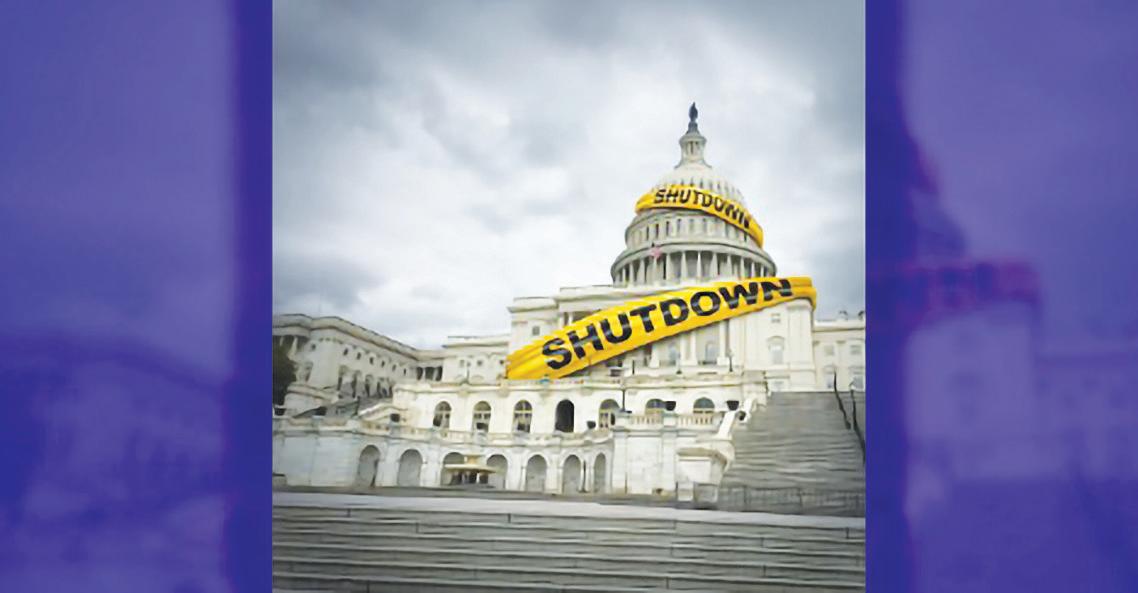
America is being strangled by its own government. Forty million people who depend on food stamps to survive are about to lose them because Donald Trump decided that his personal power trip was more important than keeping the government open. The shutdown has cut deep, and this week, those cuts reach the dinner tables of the working poor.
The Supplemental Nutrition Assistance Program, known as SNAP, has always been a mirror to this nation’s soul. We give 40 million people food stamps because corporations refuse to pay a living wage. Most recipients work. They bag groceries, stock shelves, clean offices, and pour coffee for executives who earn more in a day than they will in a lifetime. But because the country’s biggest companies pay starvation wages, taxpayers are forced to step in. SNAP has become corporate welfare, a subsidy for greed. If those same corporations paid
a living wage, that 40 million number would plummet. Yet the outrage is not over the imbalance of wealth or the rising cost of survival. Instead, it’s aimed at the people who need help just to feed their families. The question is why anyone would lose their mind over 40 million Americans having access to food, but not blink at the $40 billion Trump just sent to Argentina. Nobody wants to talk about that money. Because legislators refuse to raise the minimum wage to a livable level, people are drowning. Rent is too high. Health insurance is skyrocketing. Home insurance premiums have doubled in some states. The working class is crushed under a system designed to make poverty permanent. It’s not getting better when career and hobby politicians—some who treat public office like a pastime— keep playing with the economy for personal gain. The president himself has turned governing into a hustle. He’s out here
levying tariffs when he’s angry and playing insider trader when he’s not. The rich man’s talking points never change. Starbucks’ CEO made $95.8 million in salary last year. The average barista earns between $12,000 and $23,516 annually. Does that make any sense? Approximately 1.3 million workers earn the federal minimum wage, and 2.7 million earn below it. Those are the people Donald Trump has abandoned.
At the same time, Trump has seized control of the mainstream media. CNN’s CEO Mark Thompson reportedly told his staff to ease off coverage of Trump demolishing the East Wing of the White House to build his $300 million ballroom after a visit there. It’s a depressing spectacle watching major outlets obey a would-be dictator before he even demands it. If they won’t hold him accountable for corruption, the weaponization of the Justice Department, or the Epstein connections, what chance
do Americans have for real truth? Meanwhile, Trump continues to work very hard to make sure this nation will never again have free or fair elections. It sounds dramatic to people who avoid hearing his words, but the man keeps saying them himself. Trump doesn’t act like the President of the United States. He acts like a New York real estate huckster still hustling for the next sale, weighing in on every petty, meaningless issue that keeps his name in headlines. As one social media user put it, “Not one good word is ever uttered except in self-adulation. There are so many horrid people in America, in his opinion, it’s amazing that he abides living in such a godforsaken country. If it weren’t for the acolytes, he’d run away in a trice… Argentina, maybe?”
Another wrote, “With all these unhinged histrionics from the Mango Mussolini, I wonder when pawn shops will start being major holders in Treasury bonds?”
That’s where we are. A nation where people who work fulltime can’t buy groceries, where corporate America hoards billions while blaming the poor for needing help, and where the president lives like a king and calls it patriotism. The USDA says the SNAP money is gone. Trump says it’s the Democrats’ fault. But the truth is simpler. The man in the White House would rather starve his own people than admit that his cruelty and corruption have bankrupted more than the Treasury. They’ve bankrupted the soul of this nation.
“This is cruelty, and it is deliberate,” said Representative Rosa DeLauro.
By Fred Redmond

This Saturday marks one month of the federal government shutdown. Hundreds of thousands of federal workers—nearly 20% of whom are Black and 30% of whom are veterans—are missing their second paycheck. Families across the country will be forced to choose between paying for groceries, rent and medical care. President Trump and his allies in Congress are inflicting this pain because they would rather shut down the government than deal with the looming health care crisis that will explode costs for more than 170 million Americans. This is a crisis of the
administration’s own making and was entirely avoidable. That’s because Trump and Congress are about to let a key funding program for the Affordable Care Act (ACA), the extended tax credits, expire. Without that funding source, out-of-pocket premiums will more than double for 22 million people—and 4.2 million people will be kicked off their coverage entirely. Everyone will pay more for health care if the ACA tax credits disappear. As millions lose their coverage, hospitals and clinics will be forced to absorb billions in unpaid care costs, driving up premiums for all of us, whether you are covered through work or the ACA.
Combined with the Medicaid cuts that Republicans passed earlier this year, 179 million people with employer-based insurance could see their health care costs rise as much as $485
a year per person—or nearly $2,000 more a year for a family of four. Parents will be forced to put off checkups for their kids and people with chronic illnesses will face impossible decisions: refill their insulin or pay rent, start chemotherapy or pay the electric bill. One unexpected accident will leave a family unable to pay the mortgage or buy groceries. For our community, a spike in health care costs isn’t just smoke—it’s a five-alarm fire. Since the implementation of the ACA, the number of Black folks without health insurance has been cut in half. In 2023, it reached an all-time low. That’s in large part thanks to the increased funding for the ACA passed in 2021, including the tax credits we’re fighting for today. But if they aren’t extended, we could see those gains almost completely reversed. Without the tax credits,
Black Americans will see the largest increases in uninsurance rates—a 30% percent jump in those without coverage. One study estimates as many as 1.1 million Black Americans will lose coverage.
Even those who are able to hang on to their insurance will be forced to pay more if the tax credits aren’t extended. That funding passed in 2021 meant millions of working- and middle-class Black families with ACA coverage saw their premiums lowered or eliminated entirely. 76% of uninsured Black Americans were able to find a plan for less than $50 a month and 66% could find one entirely for free. But without the tax credits, those premiums could more than double. And those same families could be forced to pay hundreds—if not
Black Americans Cannot Afford the Trump Administration’s Health Care Cost Spike...continued thousands—more every month.
Black working people are already struggling to pay our bills. Wages for Black workers are falling and our budgets are being squeezed by higher prices on everything from food and housing to electricity and gas.
The Trump administration is offering no relief. The last thing we need is D.C. politicians hiking our health care costs.
The labor movement’s message to the president and his allies in Congress is simple: fix the health care crisis, fund the government and put working people first. Fred Redmond, the highestranking African American labor official in history, is the secretarytreasurer of the AFL-CIO, the nation’s largest labor federation, representing 63 unions and nearly 15 million workers.
By: Korbin McCarthy

What a difference a few days can make. Earlier in the week, the Los Angeles Chargers suffered a somewhat of an embarrassing 38-24 home loss to the 7-1 Indianapolis Colts, dropping them to 4-3 overall. Four days later, the Chargers hosted the 3-3 Minnesota Viking for a Thursday Night match up at SoFi Stadium. The Chargers made the most of the short week. They were able to regroup and pull off a statement making 37-10 win to get back into the win column and get their season back on track. The win improved the Chargers to 5-3 in Week 8, and put them in second place in the AFC West, one game behind the Denver Broncos who sit at the top of the Division with a 6-2 record. The Chargers beat the Broncos 23-20 in home match up in Week 3.
During their most recent outing against the Vikings the Chargers put on a show. They performed well in all 3 phases of the game. Defensively they held the Vikings to 34 total rushing yards and 157 total receiving yards. Special teams wise, they did not punt the ball all night. Offensively they controlled the game with a well balanced running and passing attack. Quarterback Justin Herbert put on a show passing for 227 yards, while the team rushed for a combined 207 yards. The rushing attack featured Kimani Vidal who led the team with 117 rushing yards.
Hard work, persistence and patience has paid off for Vidal. At the start of the season Vidal was a member of the practice. However, due to some unfortunate injuries to Omarion Hampton and Najee Harris, the opportunity for Vidal to step up presented itself.
“During my time on the practice squad I made sure I stayed focused and ready for my opportunity,” said Vidal. “This opportunity means everything to me and want to make the most
of it,” he added. Vidal’s production and hard work has not gone unnoticed. Chargers’ wide receiver Ladd McConkey give him credit for stepping up and filling the void at the running back position.
“He’s been awesome. I thought even last year when he got his opportunity he stepped up and made big plays. He’s worked hard these past couple weeks, it’s just great to see,” said McConkey. “He’s been putting in the work and he was ready for his moment. Unfortunately injuries happen but he stepped up and pick up where they left off,” added McConkey.
Even Herbert recognizes the value Vidal has brought the team and important role he plays.
“We’re lucky to have him. To lose two very good running backs like Omarion (Hampton) and Najee (Harris) they are tough to replace. Kimani (Vidal) has done such a great job of stepping up and making plays,” said Herbert. “Whether it’s catching or running out of the backfield, he done an awesome job. He is a true leader, and a great teammate. I’m glad to have him,” Herbert added.
Vidal has definitely made his presence felt on the Chargers offense. He provides another weapon for Herbert to attack opposing defenses. The second year man out of Troy not only provides the Chargers with the much-needed help out of the backfield, but will also provide them with depth in the future. Vidal’s presence is without a doubt helping the Chargers round into form offensively. Vidal is an every down back who can catch the ball out of the backfield and rush the ball between the numbers.
Vidal will play a key role in the Chargers offense when they travel to Tennessee on Sunday, November 2 to take on the Titans who sit at the bottom of the AFC South with a record of 1-7.

UDW District 3 Chair Desmond Prescott stresses, “Proposed cuts by the Trump administration will impact millions of Californians who rely on Medicaid to fund the IHSS program. Together, we’re going to stand up to those in Congress who attacked those who give care and those who receive care. We must hold them all accountable.”
Riverside, CA — The United Domestic Workers (UDW), one of California’s largest employee unions, has endorsed Proposition 50, a ballot measure that will is being placed on the November 4th statewide ballot, which is aimed at establishing fair congressional district maps.
UDW is sponsoring a comprehensive voter mobilization campaign to support its members across the state. The union plans to engage
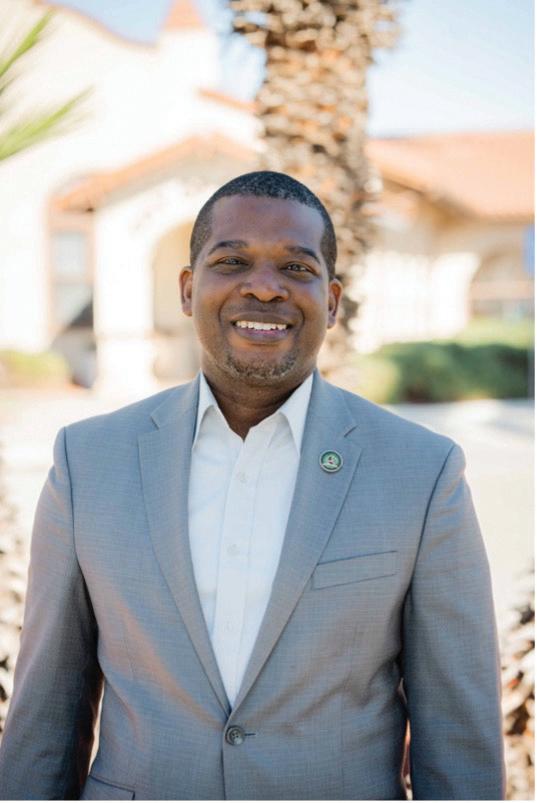
Support Services (IHSS) program, I care for seniors and individuals with disabilities who depend on us.” She continues, “Cutting Medicaid would harm those who rely on health services, especially in communities like the Inland Empire. I support Prop 50, with the intent of holding Congress accountable and ensuring that our communities are protected.”
Cynthia Williams, a full-time home care provider in Anaheim, emphasized the importance of representation: “We need congressional champions to fight for home care and family support programs. Republicans have cut vital funding for Medi-Cal and home care; however, by voting YES on Prop 50, we can push for better policies.”
undermine essential services to vulnerable populations. The initiative aims to protect California's independent Citizens Redistricting Commission and act as a check against partisan manipulations.
With over 220,000 members statewide, UDW represents dedicated home care and family child care providers who serve as the backbone of care for seniors and individuals with disabilities. These workers are dedicated to advocating for fair wages, improved working conditions, and policies that support their communities.
Riverside County Assembly member Dr. Corey Jackson emphasized the importance of this measure in upholding Black representation and protecting voting rights. "This measure amplifies our voices and keeps federal and state powers accountable," he stated. Dr. Jackson further condemned efforts to undermine Black communities and highlighted Prop 50's role in promoting fair elections and representation.
Reasons to Support Proposition 50
that voters, not politicians, decide on redistricting.
- Protecting Life and Essential Services: IHSS providers’ work can be lifesaving; recent Republican-led cuts to Medicaid, IHSS, and SNAP threaten these vital services. Proposition 50 will support efforts to fight back against these efforts.
“Donald Trump and Texas Republicans are making an unprecedented power grab designed to steal Congressional seats and rig the next election in order to hold onto their power. Prop 50 puts our elections back on a level playing field, protects independent redistricting, and gives power to the people by letting voters decide, not politicians,” said Governor Newsom.
“Our hardworking members overwhelmingly support Prop 50 and are coming out en masse to kick out those in Congress who slashed Medicaid and nutrition assistance funding to pay for a massive tax giveaway to billionaires,” says UDW Executive Director Doug Moore.
Modernizing the State’s
What
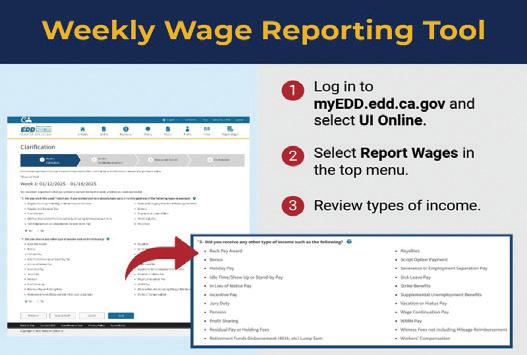
SACRAMENTO
Listening to unemployment customers, EDD learned that the wage reporting requirements can be confusing given the vast variety of earnings they may
UDW underscores Prop 50 as a vital safeguard against efforts by certain politicians to gerrymander districts and, as a result,
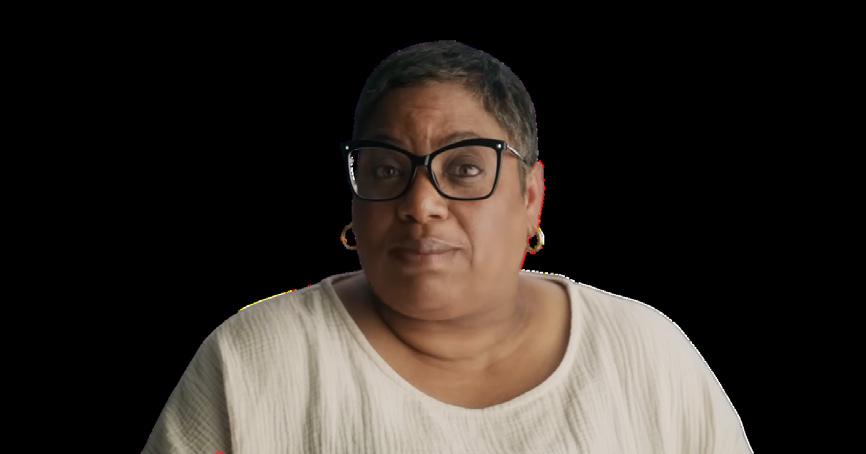

- Countering Cost Increases: Trump and MAGA Republicans have cut billions from Medicare and Medicaid and enacted tariffs that increase the cost of everyday goods. Proposition 50 will support efforts to fight back against these efforts.
- Ensuring Fair Elections: Prop 50 prevents partisan gerrymandering and guarantees
“These cuts will impact millions of Californians who rely on Medicaid to fund the IHSS program,” says UDW District Chair, Desmond Prescott, from Riverside County. He concludes, “Together, we’re going to stand up to those in Congress who attacked those who give care and those who receive care. We must hold them all accountable.” For more information or to support Prop 50, visit: https:// stopelectionrigging.com
faster and minimizes follow-up work from our staff so they can spend more time helping customers where it matters most.”
EDD Director Nancy Farias
The unemployment program can be complex. It requires that individuals receiving benefits certify, or answer basic questions every two weeks to tell the EDD that they are still unemployed and remain eligible to continue receiving benefit payments. These questions include letting EDD know if the person receiving benefits was



“The grants provide a little relief to families following a death,” she said. “We give the grants so families can focus on the process of grieving and help keep life for kids as normal as possible after they lose a parent.”
Riverside, CA. -- The CARE Project, Inc., a Riverside, California–based nonprofit that provides emotional and financial support to breast cancer survivors, not only worries about the people who suffer from this condition, but also their families. That’s why it launched a program called Adam’s Angels, which provides grants to children who have lost a parent to breast cancer.
According to Carrie Madrid, founder and president of The CARE Project, Inc., the organization has already given out about $8,000 in grants. Madrid said she came up with the idea for the project after working with a young woman who was battling breast cancer. Carmen was diagnosed at 25 years old and died at 30 years old, leaving behind her 5 year old son, Adam. Adam was also the recipient of the first award. More recently, a $5,000 grant was provided to the children of Danny Riggs, who died of metastatic breast cancer.
The funds come from local donations, including one from Orange Crest Little League (OCLL,) who donated $8,000 raised from concession sales. The 100 Women Who Care - Corona/ Riverside chapter also donated over $7,000. Madrid was touched by the OCLL donation as it was “kids helping kids.” She has been a member of the 100 Women Who Care for years and was equally grateful to have been chosen for the donation from them.
Madrid and other volunteers worked closely with Adam’s mother, spending time with her up until her final moments. She recalled the heartbreaking scene as Adam was told to say goodbye to his mom, who was on a ventilator, as she would soon be his angel.
The experience deeply affected Madrid and inspired her to create a program that could help other
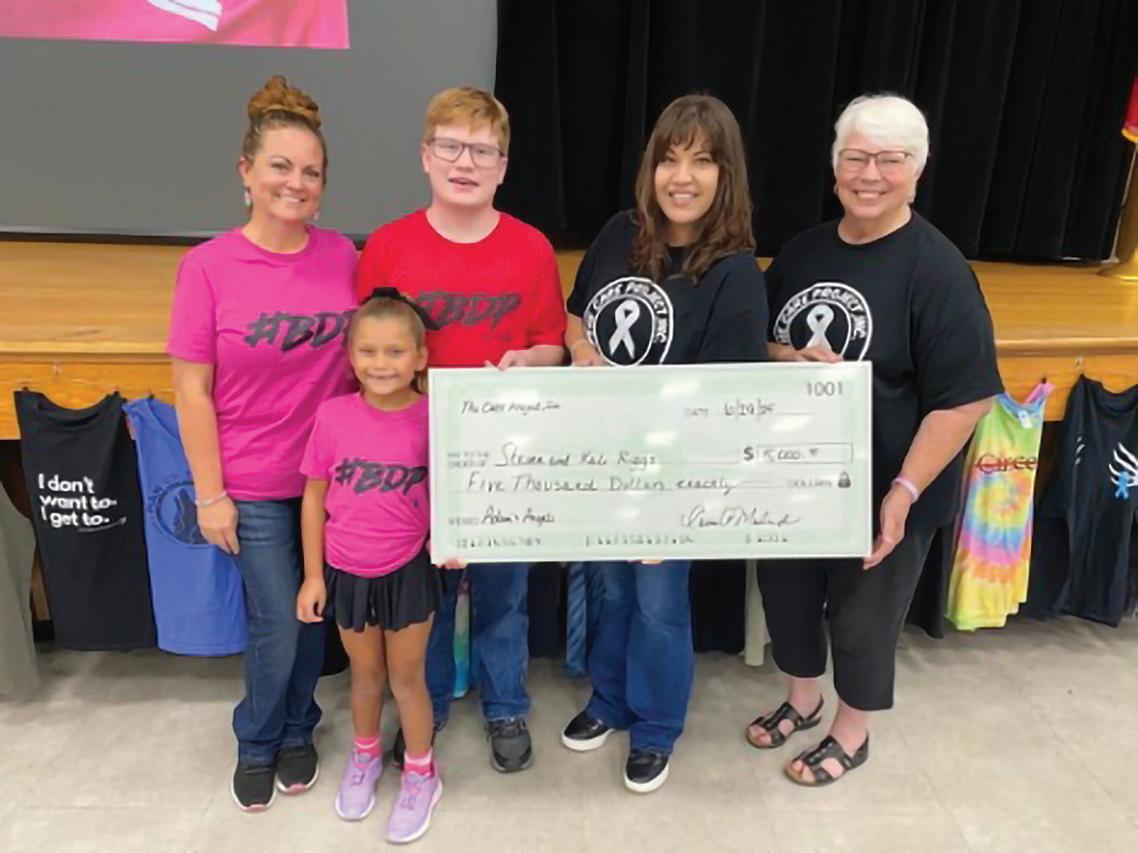
children facing similar loss. Carmen is our first “angel” of Adam’s Angels.
Madrid is a survivor of breast cancer herself. She is part of a large group who lived in Rialto in the 1980s, where residents developed cancer after drinking water that had been contaminated by chemical runoff from tire and fireworks manufacturing plants.
She is well aware of the statistics on breast cancer—about 1 in 8 women will be diagnosed in their lifetime, and roughly 1 in 726 men—Madrid understands how far-reaching the disease can be.
Madrid said the goal of the grants is to help provide support to families going through the trying time of losing a family member to cancer. She has witnessed it firsthand and knows how emotionally and financially taxing it can be.
“The grants provide a little relief to help the process,” she said. “We give the grants so families can focus on the process of grieving and help keep life as normal as possible after they lose a parent.” She said The CARE Project,
Inc.’s mission continues to grow.
“We don’t just care for survivors,” Madrid said. “We care for their families, too.” People interested in supporting Adam’s Angels can donate through The CARE Project, Inc.’s official website to help provide future grants for children who have lost a parent to breast cancer. For more information, contact Carrie Madrid at cmadrid@ thecareprojectinc.org or at (951)742-7405. For sponsorship opportunities, contact Diana Jaurigue at (951) 742-7405, djaurigue@thecareprojectinc.org , or go to TheCareProjectInc.org.
About The CARE Project, Inc. The CARE Project, Inc. is a non-profit organization committed to providing financial and emotional support to individuals undergoing breast cancer treatment in the local community. Through direct financial assistance and essential services, TCP aims to alleviate the burdens faced by patients, enabling them to focus on their healing.
3 Thursday, October 30, 2025
Antonio Ray Harvey | California Black Media
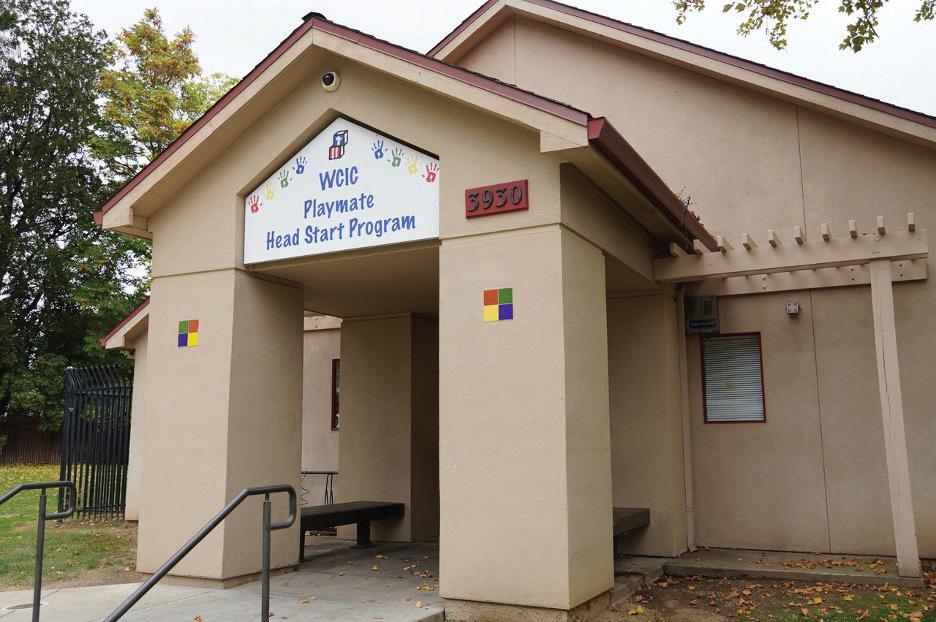
who rely on these programs.
A total of 134 Head Start programs in California and across the country will not receive their operational funding if the federal government shutdown extends beyond Nov. 1 These earlylearning programs are located in 41 states and Puerto Rico and serve more than 65,000 children, according to the First Five Fund.
The First Five Years Fund is a national organization that advocates for federal early childhood education and childcare policies.
U.S. Congresswoman Maxine Waters (D-CA-43), Ranking Member of the Committee on Financial Services, warns that the Supplemental Nutrition Assistance Program (SNAP) would also face dire consequences if the government shutdown continues.
A former Head Start teacher, Waters introduced the Head Start Shutdown Protection Act, H.R. 5790, in the House of Representatives on Oct. 17. It would require the federal government to reimburse state and local governments for funds they spend to keep Head Start and Early Head Start programs running during the gridlock.
“The (bill) requires the federal government to reimburse states,
local governments, and school districts that use their own funds to continue the operations of Head Start programs in their communities and enable Head Start grant recipients to remain open and continue to serve the children and families who depend on them,” Waters stated.
The Head Start program was created in 1965 as part of President Lyndon B. Johnson's “War on Poverty.” It started as a summer-only demonstration project to provide comprehensive early childhood education, health, and nutrition services to children from low-income families.
The program supports early childhood education and school readiness for the country’s most vulnerable children. It serves low-income children from birth to age five, including those living in poverty, in foster care, and experiencing homelessness.
In California, the state had approximately 1,835 Head StartEarly Head Start centers, with about 94,577 funded slots in 2023, according to a report by Learning Policy Institute (LPI). LPI, a nonprofit organization that conducts research and advocates for evidence-based education
policies.
Black or African American children make up about 28% of all Head Start participants nationally.
Based on analyses of the 2020–2021 school year from the National Institute for Early Education Research (NIEER), Black or African American children made up 8% of Head Start and Early Head Start children in California. The state’s overall Black child population hovers around 5.6%.
“As a former Head Start teacher, I know that Head Start provides a strong foundation for vulnerable young children, setting them up for academic success and a lifetime of learning,” Waters stated. “We cannot allow the government shutdown to disrupt their education, their families, and their potential for success.”
SNAP is set to run out in November as well, and benefits are at risk of not being paid, affecting approximately 42 million Americans. On Oct. 10, the U.S. Department of Agriculture (USDA) notified states that there will not be enough money to cover full benefits if the shutdown continues.
According to the California Association of Food Banks, approximately 5.5 million people in California receive food assistance through SNAP, known as CalFresh. In Los Angeles County, 1,578,521 people receive CalFresh assistance, 377,207 in San Bernardino County, 399,949 in San Diego County, 175,009 in Alameda County, 109,295 in San Francisco County, 251,039 inFresno County, and 266,319 in Sacramento County.
Mike Johnson (R-LA-4), the Speaker of the House of Representatives, referred to the government closure as the “Democrat Shutdown.” The Bossier City, La., native stated on Oct. 23 that the Democrats are using the shutdown as “leverage” and inflicting “suffering” on American families.
“They want to extend those Obamacare subsidies permanently without any reforms. Oh, by the way, restoring health care to illegal aliens, again, that’s 200 billion of their demand,” Johnson stated. “That’s what they’re leveraging. They’re using the American people as pawns in this game and as leverage to get all of that.”
Democratic leaders, including House Minority Leader Hakeem Jeffries (D-NY-8), have rebuffed Republican attempts to tie immigration protections to the Washington stalemate.
On Oct. 22, Gov. Gavin Newsom announced that he will deploy the California National Guard and state volunteers to help distribute food as the federal shutdown threatens benefits for millions of residents.
“This is serious, this is urgent – and requires immediate action. Millions of Americans rely on food benefits to feed their families, and while Republicans in Washington drag their feet, California is stepping up once again to fill in the gaps,” Newsom said.
Waters shared that previous government shutdowns have caused a few local Head Start grant recipients to temporarily close, suspending programs and services with minimal or no warning.
During the October 2013 shutdown, Waters stated, the Office of Management and Budget (OMB) reported that six Head Start grant recipients serving nearly 6,300 children closed their doors for several days.
“Vulnerable children and families and the dedicated Head Start teachers and staff who serve them should not have to suffer because of a government shutdown that is beyond their control,” Waters stated. “I introduced this bill to ensure that Head Start grant recipients will be able to remain open and continue to serve the children and families who depend on them
San Bernardino County conducts coordinated enforcement and outreach operation at homeless encampment sites in Fontana and Bloomington
In a coordinated effort to address public health and safety concerns while extending compassionate outreach to individuals experiencing homelessness, San Bernardino County Code Enforcement, Public Works, Homeless Services and the Sheriff’s Department conducted a oneday enforcement and outreach operation on Wednesday, Oct. 22, in Bloomington and unincorporated areas adjacent to Fontana.
“We are addressing homelessness and creating safe, healthy spaces for everyone” said Board of Supervisors Chairman and Third District Supervisor Dawn Rowe. “By combining enforcement with outreach, we ensure that every resident, housed or unhoused, is treated with dignity and respect.”
The operation was organized in response to numerous community reports about unsafe conditions and environmental health concerns linked to encampments in the areas.
“Homelessness is not an issue any one city or agency can solve alone — it requires a regional, united effort,” said Board of Supervisors Vice Chair and Fifth District Supervisor Joe Baca, Jr., who represents Bloomington. “Together, we’re taking meaningful steps to provide compassionate
outreach and restore safety in our communities.”
“In the Second District, we’ve taken a holistic approach to homelessness by addressing both immediate needs and root causes,” said Second District Supervisor Jess Armendarez, who represents Fontana. “Through investments in projects like Citylink’s wraparound service facility and food warehouse, The PATH’s conversion of a motel into a Homeless Prevention Resource and Care Center to provide housing for unsheltered families, and support for drug and alcohol treatment programs at Cedar House, we’ve created hundreds of new beds and resources that give people a path off the streets. Tackling homelessness isn’t just about shelter, it’s about stopping the bleeding by providing housing, treatment, and hope for a better future.”
While Wednesday’s effort included enforcement of county ordinances and state laws, the operation’s goal extended beyond enforcement by connecting individuals with services and restoring public areas to safe and sanitary conditions for all residents.
“Our focus is public safety and compassionate outreach,” said Code Enforcement Chief Ignacio Nunez. “We are committed to maintaining
healthy, safe neighborhoods while ensuring that individuals experiencing homelessness are given opportunities to connect with supportive services and housing resources.”
Code Enforcement led the initiative in partnership with the Sheriff’s Department, San Bernardino County Public Works, and the San Bernardino County Office of Homeless Services.
“We understand the challenges people in these encampments face,” said Homeless Services Chief Marcus Dillard. “Our mission is to provide them with real options and support. Every engagement is an opportunity to help someone take a step towards rebuilding their lives.”
Representatives from the Sheriff’s Department also emphasized the public safety component of the operation as some encampment sites were associated with illegal dumping, vehicle code violations, and criminal activity.
“Our deputies are committed to ensuring that these areas remain safe for residents while also supporting efforts to connect unhoused individuals with the services they need,” said San Bernardino County Sheriff Shannon Dicus.
In the days leading up to the operation, outreach teams contacted individuals at
Reginald S. Webb Jr. | California Black Media
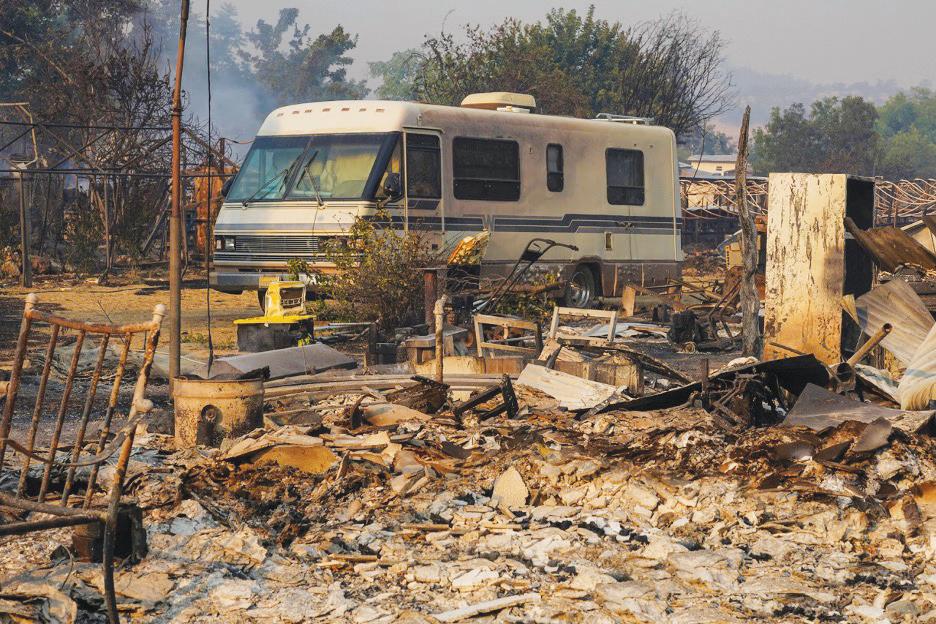
In January 2025, the NAACP and the law firm Singleton Schreiber filed a lawsuit against Southern California Edison Company and Edison International on behalf of Altadena residents whose homes and businesses were destroyed in the Eaton Fire.
The lawsuit alleges that the fire — which scorched more than 14,000 acres, claimed 19 lives, and displaced thousands — began when sparks from Edison's electrical equipment ignited dry vegetation in Eaton Canyon. Despite identifying the area as an extreme fire risk zone, Edison allegedly failed to take adequate precautions, according to the plaintiffs. Altadena, a historic community with one of the largest concentrations of Black Californians, suffered catastrophic losses during the fire. The NAACP and Singelton Schreiber say their joint effort aims not only to hold Edison accountable but also to ensure that vulnerable and historically underserved communities receive fair access to recovery resources and compensation.
Gerald Singleton, managing partner of Singleton Schreiber, spoke with California Black Media about the ongoing lawsuit, recovery efforts, and the road ahead for survivors. Singleton, whose firm has represented more than 26,000 wildfire victims nationwide, discussed the scale of the destruction, the legal process, and his message of hope for residents as they begin rebuilding their lives.
Mr. Singleton, when we last spoke, the NAACP had just joined your firm to file a lawsuit on behalf of families who lost their homes in the Eaton Fire. How is that process progressing?
known encampments to inform occupants of available services and the upcoming activity. On the day of the operation, the Office of Homeless Services operated a mobile outreach site within the area to provide immediate access to shelter placements, behavioral health support, and other vital resources.
Public Works provided heavy equipment and crews to remove debris and waste and restore impacted areas, while the Sheriff’s Department addressed criminal activity, towed unregistered or inoperable vehicles, and ensured the safety of all individuals throughout the cleanup effort.
Results from the operation included 37 encampment sites addressed, 58 individuals contacted, 16 service referrals made, one vehicle towed, one arrest made, and approximately 8.25 tons of debris and waste materials safely removed.
This joint operation underscores San Bernardino County’s commitment to maintaining public health and safety while providing unhoused residents with pathways to assistance.
Similar future coordinated enforcement efforts will continue as part of a broader effort to restore public areas impacted by encampments while addressing homelessness in the region.
The cases are moving forward. It will take a process. All the cases are consolidated, and each
one will be resolved individually.
How extensive was the overall destruction?
About 6,000 homes were destroyed, along with nearly 200 small multiunit buildings and hundreds of businesses. Altogether, more than 9,000 structures were lost.
What is the estimated cost of damages?
We expect total losses to reach between $10 and $12 billion, possibly higher. Not everyone files a claim — roughly 25% of affected people usually don’t — which affects the total recovery.
What’s the actual basis of your particular lawsuit?
We’re suing Southern California Edison because their equipment started the fire. There’s video evidence showing sparks on a decommissioned line that hadn’t been in service for more than 50 years. We believe Edison's failure to maintain and inspect its equipment caused the fire.
Can homeowners without fire insurance join the lawsuit?
Absolutely. About a quarter of those affected were uninsured, often because they’d paid off their mortgages or couldn’t afford coverage. They can still seek full recovery for their losses through this case.
Has cleanup and rebuilding begun?
Cleanup is nearly complete, and about 10% of homeowners have received permits to rebuild. But labor shortages — partly due to immigration enforcement at construction sites — are driving
We Urge Law Enforcement to Safeguard Voter Rights
ORANGE COUNTY, CA––In anticipation of the 2025 Special Election, Asian Americans Advancing Justice Southern California (AJSOCAL), the nation’s largest civil rights and legal services organization serving Asian American and Pacific Islander communities (AAPI) is sharing voting rights education throughout the region expanding its voter protection and poll monitoring efforts across Orange County. With community partners, AJSOCAL is working to ensure safe, equitable access to ballot boxes and to respond swiftly to any reports of intimidation, misinformation, or barriers to voting.
Read the full letter here: https://ajsocal.org/wp-content/ uploads/2025/10/AJSOCAL-Letterto-OCSD.pdf
“Our organization’s work is deeply rooted in protecting democracy and defending the fundamental right to vote,” said Ash Alvandi, Vice President of Orange County at ASJOCAL. “We’re doubling down on those efforts for this special election, from language access and voter education to on-the-ground monitoring, to ensure that every voter can cast their ballot freely and safely. Election integrity depends on more than secure systems; it depends on communities feeling seen, protected, and empowered.” Now more than ever, AJSOCAL calls on community members to stay informed about their rights to vote, and engage in the issues proposed in the special election.
AJSOCAL’s voting rights resource hub is available in multiple Asian languages at ajsocal.org/votingrights.
AJSOCAL’s teams will be conducting real-time monitoring and legal observation in the days leading up to the election addressing both language access issues and any verified threats that could undermine the fairness or safety of the process. As part of this initiative, AJSOCAL has issued an open letter to the Orange County Sheriff’s Department, and other California officials urging a clear public stance that prioritizes community safety and transparency near polling places. The letter demands local law enforcement to affirm their commitment to maintaining peace and protecting the right to vote.
Thursday, October 30, 2025
Edward Henderson | California Black Media

For years, Los Angeles-based painter Mia Gardner has relied on side jobs and part-time work to keep her art career afloat. But lately, her biggest challenge hasn’t been finding inspiration — it’s finding affordable health insurance.
“I looked at the marketplace last month, and the lowest plan I could find was nearly $500 a month,” Gardner said. “That’s half my share of rent. I’ve had to skip checkups and just hope nothing major happens.” Gardner’s struggle reflects a growing crisis for Californians who buy their own health insurance. With the introduction of House Resolution (H.R.)1, otherwise known as the “One Big Beautiful Bill Act” and passed by Congressional Republicans, millions could soon face higher premiums or lose coverage entirely.
Rhonda Smith, Executive Director of the California Black Health Network (CBHN), said H.R.1 poses an especially serious threat to people who fall between employer-based and government-sponsored coverage — freelancers, gig workers, and small business owners like Gardner.
“Financing your healthcare will be even more important than ever before, especially in the era of
H.R.1,” Smith said. “There are a few financial burdens that will be placed on individuals, patients, and the states due to significant federal budget cuts to public health programs. Rather than creating a new healthcare financing stream and system, the bill unfortunately puts a lot of burden and risk on patients and state governments, especially as it relates to Medicaid and the Affordable Care Act,” Smith continued.
CBHN hosted a digital webinar on Oct. 22, the final in a fivepart series titled ‘Financing Your Health Care’. Dr. Melissa Clarke, a public health physician and policy analyst, led the session which focused on the issues H.R.1 creates along with possible solutions for individuals at risk of losing their coverage.
“The Affordable Care Act created a mechanism for people to buy insurance as individuals, on a sliding scale based on income,” Clarke said. “That opened access for millions. The ‘Big Beautiful Bill,’ by contrast, makes it harder for people to qualify for Medicaid and harder to afford insurance on the Obamacare marketplace.”
Under H.R.1, federal funding cuts of up to $800 billion to Medicaid would shift more costs onto states, leading to stricter eligibility limits and frequent income verifications.
Affirming Black Children Through Books: Stories That Help Them See Their Light
By Aundrea Tabbs-Smith,
Emotional Well-being Literacy and Curriculum Coordinator, Friends Center for Children

I spent my earliest years as an educator searching for books that reflected my students’ experiences; I wanted to introduce them to books that reflected not just the colors of their skin, but also the textures of their lives. I wanted them to see themselves as I saw them: loved, powerful, and full of potential. Too often, those stories were missing from the shelves. As the Emotional Wellbeing Literacy and Curriculum Coordinator at Friends Center for Children in New Haven, Conn., I lead programming for the organization’s new Books with Friends Trolley – a mobile library that provides professional development and age- and culturally-appropriate books to family- and center-based childcare providers across New Haven. I spend my days working with young children, teaching them to name their feelings, build confidence, and understand that every part of who they are deserves to be celebrated. Books are one of our best tools to do that work. When a child hears a story that reflects their truth, something shifts fundamentally. They feel seen. Their eyes light up, their shoulders relax, and their minds open to the possibilities that await them. Below are just a few of my favorite affirming books for Black children, which will help them build that sense of belonging and possibility from
Simultaneously, marketplace subsidies that make individual plans affordable are set to be rolled back.
“Without those subsidies,” she said, “the average person simply won’t be able to afford coverage. People make choices based on their pocketbook — and if coverage becomes too expensive, they’ll go without. Over sixteen million people are expected to lose access to healthcare — either because of changes to Medicaid or because they can no longer afford insurance on the marketplace.”
For working-class Californians, especially those earning too much to qualify for Medi-Cal but too little to afford private insurance, the consequences are personal and immediate.
Gardner said she’s already started rationing her asthma inhalers and skipping preventive care.
“I don’t qualify for Medi-Cal, and I don’t have a traditional employer,” she said. “It feels like I’m being punished for trying to make a living doing what I love.”
H.R.1 threatens to undo much of the progress made under the Affordable Care Act, particularly for groups who gained coverage for the first time, such as gig workers and independent contractors.
Clarke emphasized that there are still real options for people navigating this new landscape. Her top recommendation: community health centers, which operate in nearly every county and provide primary care on a sliding scale based on income.
“They are federally funded to see you on a sliding scale, which means they take your income into account. Based on your income, you may have absolutely no out-of-pocket costs. They often provide wonderful care — not just doctors, but social workers, nurse practitioners, and specialists. If they don’t have the specialist you need, they’ll help you get to one.”
You can find community care centers in your area on the California Social Services website.
She also urged patients to look into medication assistance programs, such as NeedyMeds. org or manufacturer discount cards, which can help lower prescription costs for chronic conditions like diabetes or asthma.
The CancerCare Copayment Assistance Foundation is another outlet Dr. Clarke mentioned to provide assistance. Finally, for those losing Medicaid or Medi-Cal coverage, Clarke encouraged appealing the decision. She mentioned that at times the decision is based on missing paperwork or outdated income information, but patients need to act quickly to avoid a lapse in coverage. She also encouraged attendees to negotiate hospital fees even if you don’t qualify for charity care, noting that for hospitals, a reduced fee that gets paid is better than getting no payment at all on a full bill.
“Health insurance isn’t just about emergencies,” she said. “It’s about staying proactive — getting screenings, vaccines, and care before small problems become big ones.”
Q&A: Why the NAACP Is Suing Edison Over the Eaton Fire ...continued from page 3 up costs and slowing progress.
What assistance has been available to victims so far?
FEMA handled much of the cleanup and provided limited payments and rent vouchers to uninsured people. Several charities, including the Red Cross and local faith-based groups, also helped. But most large-scale federal and state aid programs have expired.
How long might this legal process take?
There are about 160 firms involved, and our trial is currently set for January 2027. We’re asking the judge to move it up to September 2026 so mediations — and hopefully settlements — can begin sooner.
Are there mental health
resources for residents dealing with trauma and loss?
Some people can access therapy through insurance. For uninsured clients, we work with providers who treat them on a lien basis — meaning they’ll be paid from lawsuit proceeds. It’s not a perfect system, but it ensures people can get help now.
What message do you have for families still struggling to recover?
The first year after a fire like this is the hardest. People are just now feeling the full emotional weight of what they’ve lost. But once rebuilding begins, hope returns. My message is: hold on. The community will be largely rebuilt, your life will get back on track, and you will put a lot of this behind you.
Victorville Senior Citizens Club 14874 S. Mojave Dr. Victorville CA 92395 760-245-5018
BINGO: Saturday November 8th & 22nd n, BUY IN $25 Pay Out $75-$200 Doors open 10:15am / game start 11:00am
The Way World Outreach Ministry
Thanksgiving Banquet Dinner: Saturday November 15, 9am-12pm ALL ABOVE EVENTS OPEN TO PUBLIC For additional information regarding Membership & Hall Rental Availability Call 760-245-5018
their earliest moments.
Homemade Love by bell hooks
Appropriate for ages birth through 3-years-old
The celebrated poet and feminist thinker bell hooks teamed up with illustrator Shane W. Evans to create a lyrical, lovesoaked board book that reminds children that they are loved, cherished and supported, even when they make mistakes or feel afraid.
I love this book because it’s a gentle affirmation of unconditional love, perfect for bedtime or any moment a child needs reassurance. The text is simple yet lyrical, filled with affectionate nicknames and rhythmic phrasing that makes it perfect for reading aloud. This book is a tender anthem for secure attachment, which is something every young child needs to thrive.
Bedtime Bonnet by Nancy Redd
Appropriate for 2- through 6-years-old
This joyful tribute to family is the first picture book to shine a light on nighttime hair rituals for Black people, an experience
Buys T.D.s and Buys/Lends on Partial Interests
OVER 40 YEARS OF FAST FUNDING Principal (818) 248-0000 Broker WWW.VIPLOAN.COM *Sufficient equity required - no consumer loans Real Estate License #01041073 Private Party loans generally have higher
HAS $1MIL TO LEND ON CA. REAL ESTATE* CA Department of Real Estate, NMLS #339217
WITNESS FOR JUSTICE Issue #1279
Rachel Hackenberg
Affirming Black Children Through Books: Stories That Help Them See Their Light...continued familiar to many young girls who’ve misplaced their bonnet before bed. Bedtime Bonnet offers a tender glimpse into cherished hair care traditions and honors the deep bonds shared across generations in a loving, close-knit Black family.
This book showcases the importance of hair care in Black culture, making it both relatable and educational. It also reinforces the idea that these small acts are part of a shared experience. For any child with a nighttime hair routine, it’s a validating and joyful reflection of their lives.
I Am Every Good Thing by Derrick Barnes
Appropriate for 3- through 8-years-old
The bold and self-assured narrator in this story dreams big and embraces every part of who he is. He is imaginative, daring, intelligent, humorous, and loyal. He stumbles at times, but when the fear creeps in, he never stops showing the world his true self. This book is powerful because it centers a confident young Black boy who celebrates his identity, dreams, and resilience. It offers a counter-narrative to stereotypes, showing Black children as joyful, brilliant, and full of promise. And the prose is beautiful, rhythmic and bold; this reads like a spoken word poem.
Jayden’s Impossible Garden by Mélina Mangal
Appropriate for 4- through 9-years-old
Jayden finds beauty and life all around him in the city, from squirrels foraging to cardinals singing and dandelions blooming. But when his mom isn’t convinced that nature exists in such a busy place, Jayden is determined to change her mind. Jayden teams up with his friend Mr. Curtis to start a community garden. As the garden grows, so does a sense of connection among neighbors, and soon his mom begins to see the wonder of nature through Jayden’s eyes. This book gently challenges the idea that nature only exists in rural spaces. It shows how even in a bustling city, life flourishes. It inspires young readers to notice and care for the natural world around them, wherever they live.
Emotional well-being starts early and is built on the foundations of connection, reflection and love. When we read stories that affirm who children are, we teach them pride, compassion and belonging. These books aren’t just stories; they’re tools for building identity and healing. Some of my most powerful experiences working with young children have been reading to children who see themselves in a book for the first time, smiling as someone whispers, “That looks like me.”
Aundrea Tabbs-Smith is the emotional well-being literacy and curriculum coordinator at Friends Center for Children in New Haven. She’s also the author of Never Too Much and For the Quiet Black Girl: Trying to Find Her Voice in a Predominately White Space. V.I.P. TRUST DEED COMPANY
“But the emperor has no clothes!” cries the child in the crowd. And so cry we all, when our public leaders embrace an obvious scam without a trace of remorse, without a blush of embarrassment. “No kings,” we shout against unilateral political power. “No occupation,” we shout against military action in our own cities and neighborhoods. “No theocrats,” we shout against the imposition of puritanical laws.
Pointing our finger at naked hubris on parade takes childlike audacity.
Contending with our own naked hubris, however, takes maturity.
Those of us who are white American Christians have a very particular and blatant pretense to contend with, a twisted scam that has been run in the name of Jesus for centuries:
The belief that Christianity + whiteness = righteousness.
= authority.
= importance.
The impact of this historic and ongoing con is monstrous. Yet despite clear knowledge of our supremacy problem, white American Christianity as a whole continues to parade its pretense through the streets: uncompromising in our occupation of stolen lands; undeterred from our conviction that white American Christian values are best for the world (even as we fight amongst ourselves over which set of values that is); unashamed to view ourselves as exceptions to our own history. There are not enough protest posters in the world to make fig leaves that will adequately cover the extent of such hubris.
White American Christianity still seeks no king but itself, no occupation but its own, no values unless we approve. We are impressively naked, wrapped in the scam we’ve inherited and perpetuated. When our nakedness is pointed out, the white tears we cry do not veil our self-importance.
“Happy are those whose sin is covered,” observes the psalmist.
“But when we hide our iniquities from our own awareness and before God, then we waste away.” (See Psalm 32:1–4.)
Collective repentance, in liturgy and in life, is essential in our state of torment—not as an effort to cover the nakedness of white American Christianity but as a spiritual practice to strip it more completely of its long-running con.
Collective repentance requires our white American Christian theology to mature in its understanding of salvation. If indeed Jesus came to save us all, then Jesus is the Good Samaritan and we are the battered faith dying in a ditch. We are the lazy servant with our faith buried in the dirt of racism and fear. We are the hungry, the sick, and the imprisoned who so greatly resent a self-image of need that we built and still embrace social systems that force others into hunger, illness, and imprisonment. If indeed Jesus came to save us all, then our white American Christian theology cannot position us as salvation-bearers and eager-beaver-Jesus-helpers. We cannot be disciples of a oneby-one savior, whether that’s a “personal Lord and Savior” or a “one-man justice act” called Jesus. Collective repentance of our supremacy sin needs a collective savior, and we white American Christians are no more and no less than those who need salvation.
NOTICE INVITING BIDS
COACHELLA VALLEY UNIFIED DISTRICT
NOTICE IS HEREBY GIVEN that the Coachella Valley Unified District, acting by and through its Governing Board, hereinafter referred to as “District”, will receive prior to 2:00 pm on November 21, 2025, online bids for the award of a Contract for the following:
BID NO. 174-2025FB
WESTIDE ELEMENTARY SCHOOL PLAYFIELD IMPROVEMENT
PROJECT AND PARKING LOT EXPANSION
All bids shall be made and presented only on the forms presented by the District. Bids shall be received at the following website https:// pqbids.com/coachella-valley-usd/ and shall be opened and publicly read aloud at 2:00 pm on November 21, 2025 at the Coachella Valley Unified District, Board Room located at 87-225 Church Street, Thermal, CA 92274. Any bids received after the time specified above or after any extensions due to material changes shall be disqualified and unopened. Miscellaneous Information Bids shall be received in the place identified above, and shall be opened and publicly read aloud at the above-stated time in the CVUSD Board Room. The bid documents are available for free download at the District Bid Manager Portal: https://cloud.astihosted.com/CVUSD/dbm/ Vendor/Ven_Default.asp. All vendors interested in the project must be registered users and download/print their own set of bidding documents. There will be a
Pre-Bid Conference at 9:00 am on November 12, 2025 at Westside Elementary School located at 82225 Airport Blvd. Thermal, CA 92274, Please report to Admin Building. Any Contractor bidding on the Project who fails to attend the entire mandatory job walk and conference will be deemed a non-responsive bidder and will have its bid returned unopened. Scope of work to include but not limited
the selection process selected does not preclude the District from using any of the additive or deductive alternates from the Contract after the lowest responsible responsive bidder has been determined.
Prequalification of Bidders
As a condition of bidding for this Project, and in accordance with California Public Contract Code section 20111.5, prospective bidders are required to submit to the District a completed set of prequalification documents on forms provided by the District. These documents will be the basis for determining which bidders are qualified to bid on this Project. Bids will not be accepted if a Contractor has not been prequalified where prequalification is required. Prequalification documents are available from the Coachella Valley Unified School District Website at https://pqbids.com/coachella-valley-usd/ . Prequalification documents must be submitted no less than (10) ten business days prior to bid opening. Contractors will be notified by telephone, fax or by email of their prequalification rating within a reasonable period of time after submission of their prequalification documents, but not less than one day prior to the bid opening date. If this Project includes work that will be performed by mechanical, electrical or plumbing (“MEP”) subcontractors (contractors that hold C-4, C-7, C-10, C-16, C-20, C-34, C-36, C-38, C-42, C-43 or C-46 licenses), such MEP contractors must also be prequalified. A list of prequalified MEP subcontractors will be made available by the District to all bidders at least five business days prior to the bid opening date. It is the responsibility of the bidder to ensure that all MEP subcontractors holding any of the licenses listed above are properly prequalified before submitting a bid.
Additive/ Deductive Bid Alternates (See Section 13 of Instruction to Bidders) If the District has included additive/ deductive alternates which require all bidders to price as part of their bid, the District will utilize the following method to determine the lowest bidder in accordance with Public Contract Code section 20103.8: The lowest bid shall be the lowest bid price on the base contract without consideration of the prices on the additive or deductive items. Miscellaneous Information Bids shall be received in the place identified above, and shall be opened and publicly read aloud at Each bidder shall be a licensed contractor pursuant to the California Business and Professions Code, and be licensed to perform the work called for in the Contract Documents. The successful bidder must possess all valid and active Class “A, B, 27, 16” Licenses at the time of bid and throughout the duration of this Contract. The Contractor’s California State License number shall be clearly stated on the bidder’s proposal.
Subcontractors shall be licensed pursuant to California law for the trades necessary to perform the Work called for in the Contract Documents.
Each bid must strictly conform
Thursday, October 30, 2025
requirements will be performed by the Labor Commissioner/ Department of Labor Standards Enforcement (DLSE).
No bidder may withdraw any bid for a period of ninety (90) calendar days after the date set for the opening of bids.
Separate payment and performance bonds, each in an amount equal to 100% of the total Contract amount, are required, and shall be provided to the District prior to execution of the Contract and shall be in the form set forth in the Contract Documents.
All bonds (Bid, Performance, and Payment) must be issued by a California admitted surety as defined in California Code of Civil Procedure section 995.120.
Where applicable, bidders must meet the requirements set forth in Public Contract Code section 10115 et seq., Military and Veterans Code section 999 et seq. and California Code of Regulations, Title 2, Section 1896.60 et seq. regarding Disabled Veteran Business Enterprise (“DVBE”) Programs. Forms are included in this Bid Package.
Any request for substitutions pursuant to Public Contract Code section 3400 must be made at the time of Bid on the Substitution Request Form set forth in the Contract Documents and included with the bid.
No telephone or facsimile machine will be available to bidders on the District premises at any time.
It is each bidder’s sole responsibility to ensure its bid is timely delivered and received at the location designated as specified above.
Any bid received at the designated location after the scheduled closing time for receipt of bids shall be returned to the bidder unopened.
LETICIA C. TORRES
COACHELLA VALLEY UNIFIED DISTRICT
Leticia C. Torres, Director of Facilities, Planning and Development
Publication Dates: October 30, 2025
November 6, 2025
Mandatory Pre-Bid Conference: November 12, 2025
Bid Submittal/Opening: November 21, 2025
Published in The San Bernardino American Newspaper October 30, November 6, 2025.
NOTICE INVITING BIDS
COACHELLA VALLEY UNIFIED DISTRICT
NOTICE IS HEREBY GIVEN that the Coachella Valley Unified District, acting by and through its Governing Board, hereinafter referred to as “District”, will receive prior to 2:30 pm on November 21, 2025, online bids for the award of a Contract for the following: BID NO. 175-2025FB PETER PENDLETON ELEMENTARY SCHOOL SPORTSFIELD IMPROVEMENT PROJECT
All bids shall be made and presented only on the forms presented by the District. Bids shall be received at the following website https:// pqbids.com/coachella-valley-usd/ and shall be opened and publicly read aloud at 2:30 pm on November 21, 2025 at the Coachella Valley Unified District, Board Room located at 87-225 Church Street, Thermal, CA 92274. Any bids received after the time specified above or after any extensions due to material changes shall be disqualified and unopened. Miscellaneous Information
Bids shall be received in the place identified above, and shall be opened and publicly read aloud at the above-stated time in the CVUSD Board Room. The bid documents are available for free download at the District Bid Manager Portal: https://cloud.astihosted.com/CVUSD/dbm/ Vendor/Ven_Default.asp. All vendors interested in the project must be registered users and download/print their own set of bidding documents. There will be a mandatory Pre-Bid Conference at 11:00 am on November 12, 2025 at Peter Pendleton Elementary School located at 84-750 Calle Rojo, Coachella, CA 92236, Please report to Admin Building. Any Contractor bidding on the Project who fails to attend the entire mandatory job walk and conference will be deemed a non-responsive bidder and will have its bid returned unopened.
Scope of work to include but not limited to installation of new concrete track pathway and natural grass field, irrigation improvements, new athletic site furnishing, grading, asphalt, new fire hydrant, etc. Project time of completion: 120 days
**Note: Pursuant to Public Contract Code section 20103.8, the selection process selected does not preclude the District from using any of the additive or deductive alternates from the Contract after the lowest responsible responsive bidder has been determined.
Prequalification of Bidders
As a condition of bidding for this Project, and in accordance with California Public Contract Code section 20111.5, prospective bidders are required to submit to the District a completed set of prequalification documents on forms provided by the District. These documents will be the basis for determining which bidders are qualified to bid on this Project.
Bids will not be accepted if a Contractor has not been prequalified where prequalification is required. Prequalification documents are available from the Coachella Valley Unified School District Website at https://pqbids.com/coachella-valley-usd/ . Prequalification documents must be submitted no less than (10) ten business days prior to bid opening. Contractors will be notified by telephone, fax or by email of their prequalification rating within a reasonable period of time after submission of their prequalification documents, but not less than one day prior to the bid opening date.
If this Project includes work that will be performed by mechanical, electrical or plumbing (“MEP”) subcontractors (contractors that hold C-4, C-7, C-10, C-16, C-20, C-34, C-36, C-38, C-42, C-43 or C-46 licenses), such MEP contractors must also be prequalified. A list of prequalified MEP subcontractors will be made available by the District to all bidders at least five business days prior to the bid opening date. It is the responsibility of the bidder to ensure that all MEP subcontractors holding any of the licenses listed above are properly prequalified before submitting a bid. Additive/ Deductive Bid Alternates (See Section 13 of Instruction to Bidders)
of Industrial Relations. Pursuant to California Labor Code section 1720 et seq., it shall be mandatory upon the Contractor to whom the Contract is awarded, and upon any subcontractor under such Contractor, to pay not less than the said specified rates to all workers employed by them in the execution of the Contract.
A Contractor or Subcontractor shall not be qualified to bid on, be listed in a bid proposal, subject to the requirements of Section 4104 of the Public Contract Code, or engage in the performance of any contract for public work, as defined in the Labor Code, unless currently registered and qualified to perform public work pursuant to Labor Code section 1725.5. It is not a violation of this section for an unregistered contractor to submit a bid that is authorized by Section 7029.1 of the Business and Professions Code or by Section 10164 or 20103.5 of the Public Contract Code, provided the contractor is registered to perform public work pursuant to Section 1725.5 at the time the contract is awarded.
The Contractor and all subcontractors shall furnish certified payroll records as required pursuant Labor Code section 1776 directly to the Labor Commissioner in accordance with Labor Code section 1771.4 on at least on a monthly basis (or more frequently if required by the District or the Labor Commissioner) and in a format prescribed by the Labor Commissioner. Monitoring and enforcement of the prevailing wage laws and related requirements will be performed by the Labor Commissioner/ Department of Labor Standards Enforcement (DLSE).
No bidder may withdraw any bid for a period of ninety (90) calendar days after the date set for the opening of bids.
Separate payment and performance bonds, each in an amount equal to 100% of the total Contract amount, are required, and shall be provided to the District prior to execution of the Contract and shall be in the form set forth in the Contract Documents.
All bonds (Bid, Performance, and Payment) must be issued by a California admitted surety as defined in California Code of Civil Procedure section 995.120. Where applicable, bidders must meet the requirements set forth in Public Contract Code section 10115 et seq., Military and Veterans Code section 999 et seq. and California Code of Regulations, Title 2, Section 1896.60 et seq. regarding Disabled Veteran Business Enterprise (“DVBE”) Programs. Forms are included in this Bid Package.
Any request for substitutions pursuant to Public Contract Code section 3400 must be made at the time of Bid on the Substitution Request Form set forth in the Contract Documents and included with the bid. No telephone or facsimile machine will be available to bidders on the District premises at any time.
It is each bidder’s sole responsibility to ensure its bid is timely delivered and received at the location designated as specified above.
Any bid received at the designated location after the scheduled closing time for receipt of bids shall be returned to the bidder unopened.
LETICIA C. TORRES COACHELLA VALLEY UNIFIED DISTRICT
Leticia C. Torres, Director of Facilities, Planning and Development
Publication Dates: October 30, 2025 November 6, 2025
Mandatory Pre-Bid Conference: November 12, 2025
Bid Submittal/Opening: November 21, 2025
Published in The San Bernardino American Newspaper October 30, November 6, 2025.
Governor Newsom urges the Supreme Court to strike down Trump’s illegal tariffs
SACRAMENTO — Governor Gavin Newsom and Attorney General Rob Bonta today stood up for California families and the state’s economy by filing an amicus brief urging the U.S Supreme Court to strike down President Trump’s illegal tariffs. The President invoked an emergency law to impose tariffs without permission from Congress. But no emergency exists, the emergency law doesn’t allow for tariffs anyway, and instead of helping the American economy, Trump’s illegal tariffs have hurt families, farmers, and businesses by creating mass uncertainty and sending shockwaves through a previously healthy economy.
“Trump’s illegal tariffs are punishing American families and small businesses. It’s not policy or business acumen — it’s betrayal and grift. Americans are struggling to put food on their tables, and Trump’s response is to send $20 billion in taxpayer money to Argentina and leave our farmers and ranchers out to dry. While Trump continues to play political games and make shady deals for his own benefit, California will keep fighting on your behalf. We urge the court to stand firm against authoritarianism and uphold the rule of law that they are sworn to protect.”
Governor Gavin Newsom
The Trump Effect
California is the largest economy in the nation and the fourth-largest economy in the world. The Golden State is the largest importer of goods among the fifty states. Since February 2025, President Trump has issued an unprecedented and chaotic series of executive orders imposing tariffs ranging from 10% to 145% on nearly every trading partner of the United States. The illegal tariffs imposed by President Trump threaten to devastate California’s economy, depriving it of $25 billion and more than 64,000 jobs.
Governor Newsom urges the Supreme Court to strike down Trump’s illegal tariffs ...continued
Don’t believe us? Hear it from President Ronald Reagan instead: "High tariffs inevitably lead to retaliation by foreign countries and the triggering of fierce trade wars. The result is more and more tariffs, higher and higher trade barriers, and less and less competition. So, soon, because of the prices made artificially high by tariffs that subsidize inefficiency and poor management, people stop buying. Then the worst happens: Markets shrink and collapse; businesses and industries shut down; and millions of people lose their jobs."
ICYMI: Secretary Rollins Pens Newsweek Op-Ed “Theatrics Don’t Feed the Hungry”
Washington, D.C., October 28, 2025) – U.S. Secretary of Agriculture Brooke L. Rollins published an opinion piece in Newsweek addressing Senate Democrats for holding out funding for the Supplemental Nutrition Assistance Program (SNAP) by keeping the government shutdown.
“Instead of focusing on reopening the government and keeping programs like SNAP and WIC functioning, or air traffic controllers and law enforcement officers paid, or the military funded, Senate Democrats are holding firm on propping up failed government programs with billions in health care subsidies that benefit corporations over people,” said Secretary Brooke Rollins. “It’s long past time to stop voting against the American people. Reopen the government. Fund these programs. End the theatrics and put the well-being of the American people first.”
Read the full piece below.
What began as a program for the neediest Americans, the Supplemental Nutrition Assistance Program (SNAP), commonly referred to as food stamps, has exploded to serve one in every eight Americans. The food stamp rolls have not only skyrocketed due to eligibility loopholes and regulatory boondoggles—each allowing for millions of work-capable adults with school age children to participate—but a program that has recently become a “leverage” point for Democrats in their self-inflicted government shutdown. Subsequently, nearly 42 million individuals, more than 22 million households—households including veterans, children and the elderly—are being held hostage to Chuck Schumer’s demands that at their core, prioritize illegal aliens over American citizens.
It is striking: one moment the program is held up as a moral imperative by Democrats, who at every farm bill, continuing resolution, or annual funding bill negotiation lambast Republicans to increase participation and funding for SNAP. The next, it becomes a leverage point for gender mutilation and health care for illegals. The neediest among us must not be treated as bargaining chips in the broader fight over spending, immigration, or whatever extraneous priorities are consuming Democrats’ attention.
So, the truth has revealed itself. Democrats’ support for programs like SNAP is now reduced to cynical control over people’s lives.
Instead of focusing on reopening the government and keeping programs like SNAP and WIC functioning, or air traffic controllers and law enforcement officers paid, or the military funded, Senate Democrats are holding firm on propping up failed government programs with billions in health care subsidies that benefit corporations over people. Not to mention exposing their far left agenda items: illegal aliens, open borders, gender mutilation and more. Meanwhile, millions of American citizens, including those reliant on SNAP, wait anxiously, wondering whether they can rely on the temporary safety net they were told existed for rough times. It is unconscionable. The very essence of government’s responsibility is to the citizens who live and work here—to protect their interests first.
Let’s be clear, when the government shuts down, seniors, children, veterans and vulnerable communities lose. This is not a theoretical critique. This is real life. Democrat Whip Katherine Clark said the quiet part out loud: “Of course there will be families that are going to suffer ... but it is one of the few leverage times we have." Senate Democrats built much of their identity on being the party of “helping the helpless.” Now they are failing those very people, among millions of others, each reliant on a functioning U.S. government. President Donald Trump has made it clear: reopen the government, get government funding back on solid footing, restore the confidence of American families who count on programs like SNAP and stop treating them—and their well-being—as pawns in funding battles. Prioritize American citizens. Prioritize their children.
American citizens should come first. Those who need food assistance while between jobs, the elderly, disabled and children deserve more than political delay and brinksmanship. It’s long past time to stop voting against the American people. Reopen the government. Fund these programs. End the theatrics and put the well-being of the American people first.
Brooke L. Rollins is the 33rd United States Secretary of Agriculture.
Weber
By Sunita Sohrabji
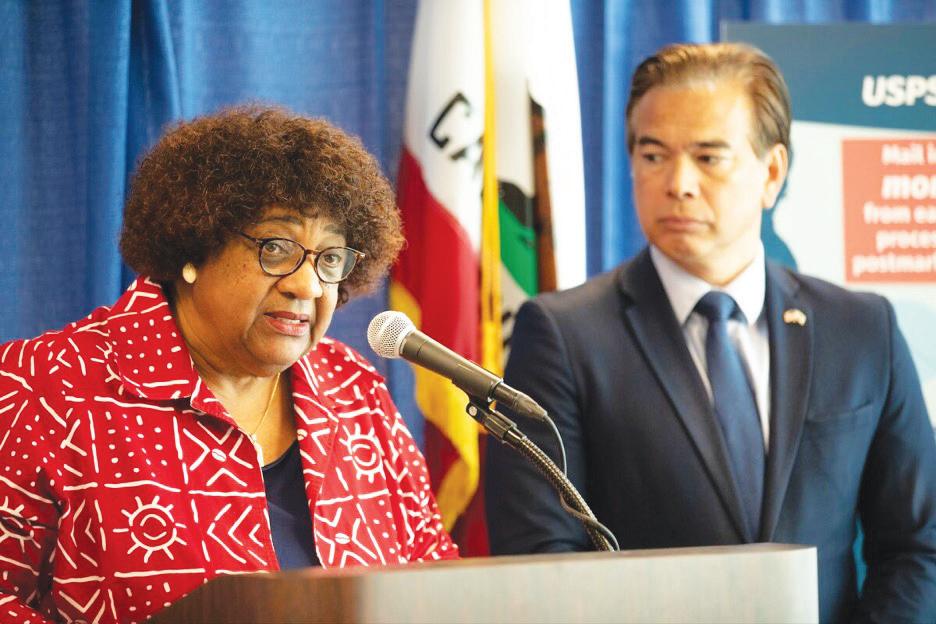
Though her family has lived in the US for more than 200 years, California Secretary of State Dr. Shirley Weber is only a secondgeneration voter — a reminder, she says, of the multiple challenges minority voters face in accessing the ballot box.
“My ancestors never got a chance to vote: not that they didn’t have the right to vote, but because of the difficulty and the challenges of being able to register,” said Weber Oct. 21, speaking at a special news briefing hosted by American Community Media.
Weber’s family moved to California in the 1950s. Her father was in his 30s when he successfully registered to vote and cast his first ballot. “So we recognize — in our family, and in so many other families — just how precious this experience is. Having your voice, having the ability to vote, having it accessible, making it available to so many, is really, really important.”
“And that’s what we’ve been trying to do with every election here in California with its very
diverse population. The ability to be able to vote comfortably, and to be able to vote in a timely manner that really counts your ballot and makes sure your voice is heard,” she said.
Special Election
As of Oct. 20, more than 2.5 million votes had already been cast for California’s special election Nov. 4, which has just a single issue on the ballot. Prop. 50, if approved by voters, would allow the State Legislature to redraw Congressional districts, bypassing California’s independent citizensredistricting commission until 2030. Democratic leaders in California hope to counter Texas’ redrawn maps, which would add 5 Republican seats in Congress. California would gain 5 Democratic seats with its redrawn maps.
Weber did not discuss Prop. 50 during the 30-minute news briefing, and instead focused her remarks on the ease with which California voters can participate in the special election. Every eligible voter in the state has
already received a mail-in ballot: these can be dropped off in the mail box, at the post office, or at a polling site Nov. 4. She urged people who are voting by mail to drop their ballots off early, and — if going to the post office on Nov. 4 — to go inside and have the ballot stamped.
Secure ballot boxes have also been placed around the state. Weber emphasized that these are safe, and cannot be carried off. “These are monstrosities. They’re like a tank made of steel and screwed in the ground. The only way you can access them is with a key,” she said. Ballot boxes will remain accessible for drop off until 8 pm on Nov. 4. Voters can search for their closest ballot box on this site: https:// caearlyvoting.sos.ca.gov/
Same Day Registration
The last day to register to vote and receive a ballot in the mail was Oct. 20. But eligible voters who missed the deadline can come to a polling place Nov. 4 and register that same day to cast their ballot. Weber noted these are provisional voters: their ballots would not be counted until all their eligibility information has been verified. “But they will have a chance to vote and influence the election,” she said. California is one of 23 states that allows same day registration to vote. Potential voters in the state can register in person with a driver’s license or state ID, and the last 4 digits of their Social Security number.
Voter fraud is extremely rare in California. In a report presented to the California state Senate last
August, the California Research Bureau, in collaboration with the California State Library, found just 10 instances of voter fraud for the period 2020-2024.
In-Language Ballots
California’s Voter Bill of Rights guarantees a number of protections for eligible voters. Ballots are currently available in 9 languages other than English. Voters can obtain ballots written in Spanish, Chinese, Hindi, Japanese, Khmer, Korean, Tagalog, Thai, and Vietnamese. Additional languages will be added by the Secretary of State’s office if there are enough voters who primarily speak that language, said Weber, noting that adding additional in-language ballots is a complex process. Ballots have to reflect the nuances of complicated measures. “You can’t just Google it,” she noted with a laugh.
Voters in California can also have friends or family assist them in filling out their ballots. However, they cannot obtain support from an employer or a union representative, noted Weber.
The Secretary of State’s remarks came as the Supreme Court deliberates Louisiana v. Callais, a seminal redistricting case which could determine the fate of the national Voting Rights Act. Of particular concern in the case is Section 2 of the Voting Rights Act, which bars voting practices that discriminate against voters based on their race or color. The Court is expected to issue its decision by June 2026.
By Stacy M. Brown
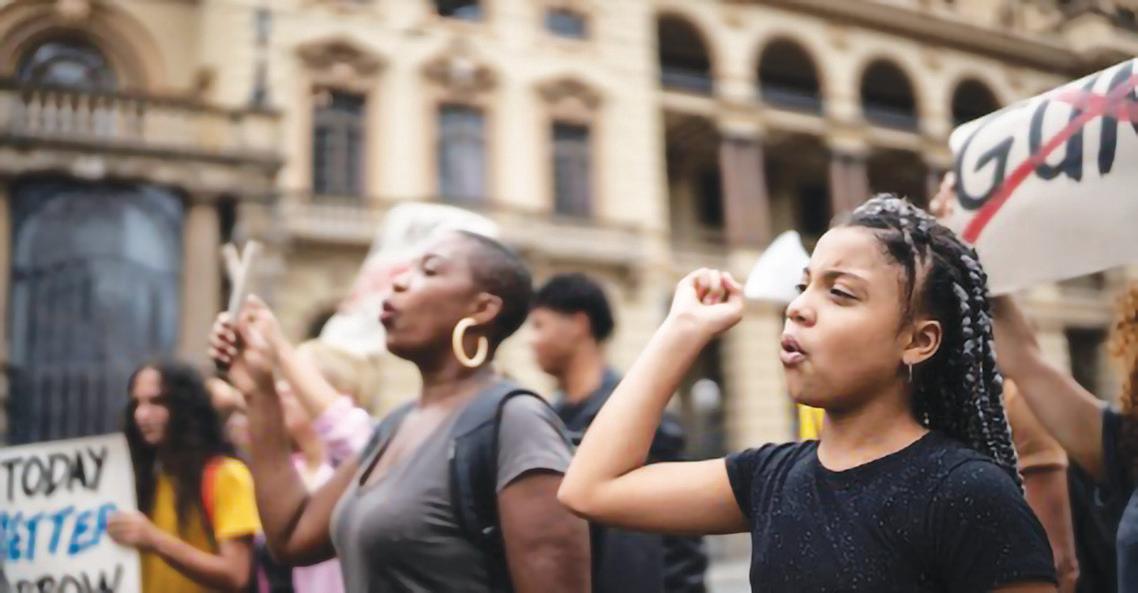
Protesters during a demonstration in the street
They called it Shared Chains. The episode ran on the “Blaac718” podcast, and in that dim space between sound and silence, an Asian American man spoke a truth this country has long tried to drown. “I always tell people,” he said quietly, “the day the Latino, African American, Asian, and other communities realize they share the same oppressor is the day we start winning. Because if it wasn’t for the civil rights movement, there would not be 22 million Asian Americans in this country. Your success, your prosperity, your civil rights that you enjoy right now were paid for with Black blood.” There it was. The truth this nation despises most. The truth is that America’s freedom has always been underwritten by the suffering of Black people. That the Constitution itself, written in the ink of ideals and the sweat of enslaved hands, was never worth the paper it was printed on until Black Americans forced it to be.
The Civil Rights Act of 1964 outlawed segregation and discrimination, dragging America closer to its own promises. But that act was not born from goodwill. It was born from the anguish of a people beaten, jailed, and humiliated, who still believed enough in justice to demand it from those who denied them humanity. And
when the world began to change, it changed because of them. When President Lyndon Johnson signed the Immigration and Nationality Act of 1965, ending the racist quota system that favored white Europeans, he called it “a triumph for liberty.” But the liberty he spoke of was a harvest planted by Black hands and watered with their blood.
Latino farmworkers marched because Black people had marched before them. Asian Americans found a home because the civil rights movement forced open the nation’s gates. Women, people with disabilities, immigrants from the corners of the globe, all walked through doors built by those who had been shackled.
The Chicano movement, born of frustration and hunger, drew its rhythm from the same drumbeat that sounded in Montgomery and Selma. The Civil Rights Act, meant to crush Jim Crow, became the armor for others— Asian Americans who had been told they did not belong, now shielded by laws created from Black suffering.
“If it weren’t for the Civil Rights Movement, there wouldn’t have been a farmworkers’ movement,” said Vanessa Saplad, a Texasbased registered nurse whose family emigrated from Colombia. “It showed our people that protest
could bring power, that dignity wasn’t something you begged for — it was something you stood up and claimed.” Added Michelle Cephus, a D.C.-based accountant and LGBTQ advocate. “The Civil Rights Movement taught us what courage looks like in the face of hate. Stonewall didn’t happen in a vacuum; it happened because people like Dr. King showed us that silence is surrender, and love is an act of resistance.”
And yet, this country forgets. It forgets with a stubbornness that borders on sin. It forgets who gave it its conscience. It forgets that every movement for equality in this land began with the Black demand to be seen as human. It forgets, and in its forgetting, it repeats. “We watched Black folks march for equality, and it gave us language for our own struggles for fair housing, for fair wages, for belonging,” said Peter De Cruz Villareal, a farm worker of Filipino descent. “Their fight taught us how to stand tall, even when the system calls you invisible.” Enrique Vasquez, a Puerto Rico native and D.C. resident, added that, “Every scholarship, every chance to speak my mind, every job that doesn’t question my accent is the echo of the Civil Rights Movement. What started for one group became a promise for all of us.” Donald Trump’s second
By Shernay Williams

The center will be a first-of-akind for presidential libraries, serving as a community hub on Chicago’s South Side.
The Obama Foundation is giving the public a virtual preview of the Barack Obama Presidential Center, a 19-acre, community-rooted campus slated to open on Chicago’s South Side in spring 2026.
Located in the Jackson Park neighborhood, the space will feature a wide range of facilities and green space, including a fruit and vegetable garden, a podcast studio, a Chicago Public Library branch, and an open field — called the Great Lawn — for outdoor movies and sledding.
A new kind of presidential library
Unlike other presidential libraries, the Obama Presidential Center will be managed by the private Obama Foundation — not the U.S. National Archives and Records Administration (NARA). The NARA will, however, house and loan the former president’s fully digitized records to the center for exhibits.
In a virtual information session in early October, Obama Foundation leaders shared visual renderings and mockups detailing what to expect at the
center, which broke ground in 2021.
Many of the center’s facilities will be named after prominent individuals who foundation leaders say helped shape the former president’s and first lady’s lives. They include the John Lewis Plaza — a public space that will host outdoor performances, markets, and fairs — and the Hadiya Pendleton Atrium, which honors the Chicago teen killed by gun violence in 2013 shortly after performing with her majorette squad at President Obama’s second inauguration.
One of the center’s most unique features is the museum building design. Signifying the power of collective action, it is shaped as if four hands are coming together. The building’s exterior features words from President Obama’s speech marking the 50th anniversary of the Selma to Montgomery marches. Inside, visitors will find a mix of permanent and rotating exhibits highlighting major events and policies from the Obama presidency.
The space will also serve as headquarters for several of the Obama Foundation’s leadership and scholarship programs. Chicago residents gave feedback on the building’s construction, requesting more green space, underground parking, and accessibility via public transit.
The next public information session about the Obama Presidential Center is scheduled for Nov. 13.
FREE Shred-Fest, Compost Giveaway, & Recycling at Victor Valley MRF: Nov. 1
administration has stripped away the layers of decency this nation once pretended to have. His orders have erased Black history from national institutions, silenced diversity programs, and rolled back protections that once shielded the vulnerable. The cruelty of his immigration policies has reawakened an old truth: that the machinery of oppression never sleeps. It only changes its targets.
But through every betrayal, Black Americans remain this country’s most honest mirror. When others look away, they stand and face the fire. They always have. They did in Montgomery, where a woman sat down so a nation could rise. They did in Selma, where blood mingled with river water to baptize a new generation of freedom fighters. And they did again in the streets of Minneapolis, crying for a breath that belongs to us all. In the final breath of Shared Chains, that same Asian voice spoke again. “Liberty and rights don’t exist forever,” he said. “They exist only as long as we protect them. And if you want them to continue, it won’t be Black people fighting this battle again. You will have to fight it.”
The warning hung in the air like smoke. Because every gain that America enjoys, every inch of justice, every whisper of freedom, was carved from the wounds of those who had nothing left to give but their blood. And the question, the only question that has ever mattered in this nation, still stands: when the fire comes again, who will fight?
“The Civil Rights Movement didn’t just change laws, it changed what we could dream,” said Sybil Morehead, a 67-year-old retired South Carolina teacher. “My students today sit in classrooms that my grandmother could only clean. We’re still fighting, but because of that movement, we’re fighting from the inside now, not from the outside looking in.”
VICTORVILLE, Calif.
— Don't miss out on the Free Shred-Fest, Mulch Giveaway, and Recycling Event at the Victor Valley Materials Recovery Facility (MRF) on Saturday, Nov. 1 from 8 a.m. to 12 p.m. This event will feature drivethrough document shredding, a compost giveaway, disposal of electronic waste and appliances, and free mattress and box spring recycling. Activities offered at this event are FREE and available to residents of the High Desert. The Victor Valley MRF is located at 17000 Abbey Lane in Victorville, just off Stoddard Wells Road. This event is sponsored by Burrtec Waste Industries in collaboration with the City of Victorville.
Free Shred-Fest: High Desert residents can bring up to four banker boxes of paper documents up to 20 pounds each for secure shredding. A shredding company will be onsite so residents can watch as their documents are shredded. Shredding will take place from 8 a.m. to 12 p.m. or until the shred truck reaches full capacity.
To facilitate quick service, attendees are encouraged to have their paper boxes loaded in their car trunks for easy unloading by event staff.
Free Compost & Mulch
Giveaway: Area residents can pick up free compost and mulch during this event. Residents need to bring their own rigid bins to transport the compost home. Burrtec employees will load the bins. The combined limit is 50 gallons per household.
Free Drop-off of TVs, Computers, Appliances, Scrap Metal, and E-Waste: Area residents and businesses can drop
off TVs, computers, scrap metal, and appliances for free.
Free Recycling of Mattresses & Box Springs: Twin, full, queen, and king mattresses and box springs, along with futon mattresses can be dropped off for FREE by residents. No sleeper beds, crib mattresses, or mattresses from businesses will be accepted.
CRV Bottle and Can Buy Back: The MRF's buy-back center will be open during the event for residents to redeem CRV bottles and cans. For current prices, contact (760) 241-1284.
The Victor Valley MRF serves as the processing center for recyclables from Apple Valley and Victorville's curbside and commercial/business recycling programs. The MRF is also a buy-back and drop-off recycling center open to the public and businesses. It is regularly open Monday to Friday from 8 a.m. to 4 p.m. and closed on Saturdays and Sundays except for special events.
Attendees must remain in their vehicles until directed by an attendant to unload their items. The City of Victorville provides year-round free and convenient disposal options for residents. Visit VictorvilleCA. gov/DumpItRightVV for more information. Help us keep Victorville clean, and DumpItRightVV! Thanks to the city’s free disposal services, it’s easier than you think to dispose of unwanted items the right way. For inquiries about Shred-Fest or other recycling and disposal programs, contact the City of Victorville Environmental Programs Division at (760) 9558615.
